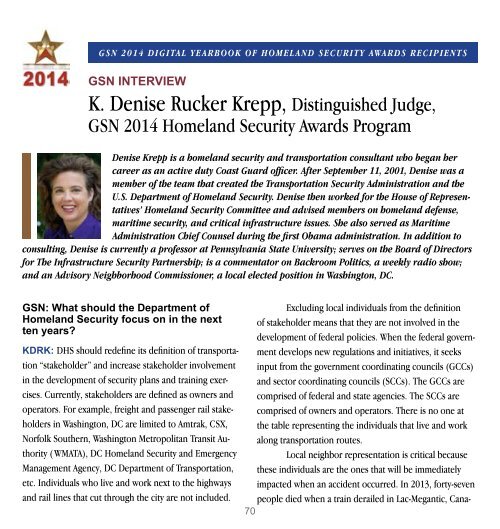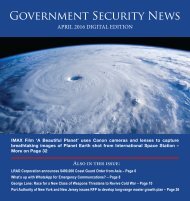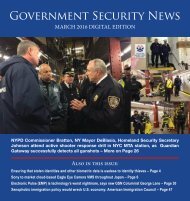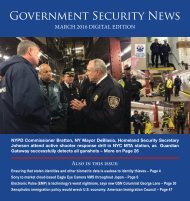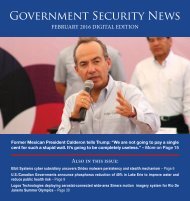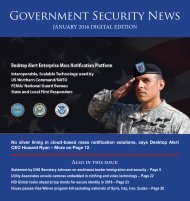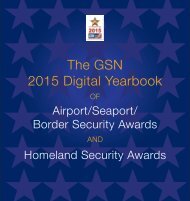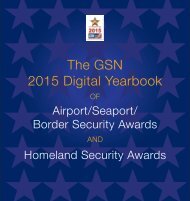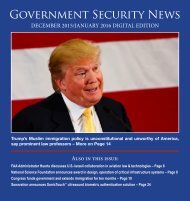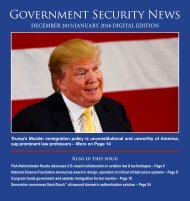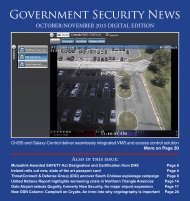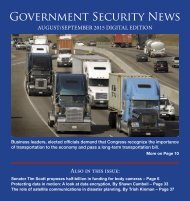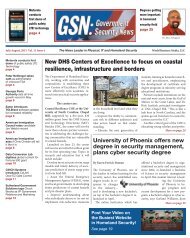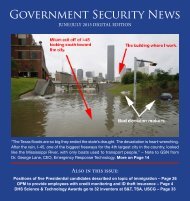2014 Digital Yearbook of Homeland Security Awards
Create successful ePaper yourself
Turn your PDF publications into a flip-book with our unique Google optimized e-Paper software.
GSN <strong>2014</strong> <strong>Digital</strong> <strong>Yearbook</strong> <strong>of</strong> <strong>Homeland</strong> <strong>Security</strong> <strong>Awards</strong> Recipients<br />
GSN INTERVIEW<br />
K. Denise Rucker Krepp, Distinguished Judge,<br />
GSN <strong>2014</strong> <strong>Homeland</strong> <strong>Security</strong> <strong>Awards</strong> Program<br />
Denise Krepp is a homeland security and transportation consultant who began her<br />
career as an active duty Coast Guard <strong>of</strong>ficer. After September 11, 2001, Denise was a<br />
member <strong>of</strong> the team that created the Transportation <strong>Security</strong> Administration and the<br />
U.S. Department <strong>of</strong> <strong>Homeland</strong> <strong>Security</strong>. Denise then worked for the House <strong>of</strong> Representatives’<br />
<strong>Homeland</strong> <strong>Security</strong> Committee and advised members on homeland defense,<br />
maritime security, and critical infrastructure issues. She also served as Maritime<br />
Administration Chief Counsel during the first Obama administration. In addition to<br />
consulting, Denise is currently a pr<strong>of</strong>essor at Pennsylvania State University; serves on the Board <strong>of</strong> Directors<br />
for The Infrastructure <strong>Security</strong> Partnership; is a commentator on Backroom Politics, a weekly radio show;<br />
and an Advisory Neighborhood Commissioner, a local elected position in Washington, DC.<br />
GSN: What should the Department <strong>of</strong><br />
<strong>Homeland</strong> <strong>Security</strong> focus on in the next<br />
ten years?<br />
KDRK: DHS should redefine its definition <strong>of</strong> transportation<br />
“stakeholder” and increase stakeholder involvement<br />
in the development <strong>of</strong> security plans and training exercises.<br />
Currently, stakeholders are defined as owners and<br />
operators. For example, freight and passenger rail stakeholders<br />
in Washington, DC are limited to Amtrak, CSX,<br />
Norfolk Southern, Washington Metropolitan Transit Authority<br />
(WMATA), DC <strong>Homeland</strong> <strong>Security</strong> and Emergency<br />
Management Agency, DC Department <strong>of</strong> Transportation,<br />
etc. Individuals who live and work next to the highways<br />
and rail lines that cut through the city are not included.<br />
Excluding local individuals from the definition<br />
<strong>of</strong> stakeholder means that they are not involved in the<br />
development <strong>of</strong> federal policies. When the federal government<br />
develops new regulations and initiatives, it seeks<br />
input from the government coordinating councils (GCCs)<br />
and sector coordinating councils (SCCs). The GCCs are<br />
comprised <strong>of</strong> federal and state agencies. The SCCs are<br />
comprised <strong>of</strong> owners and operators. There is no one at<br />
the table representing the individuals that live and work<br />
along transportation routes.<br />
Local neighbor representation is critical because<br />
these individuals are the ones that will be immediately<br />
impacted when an accident occurred. In 2013, forty-seven<br />
people died when a train derailed in Lac-Megantic, Cana-<br />
70


